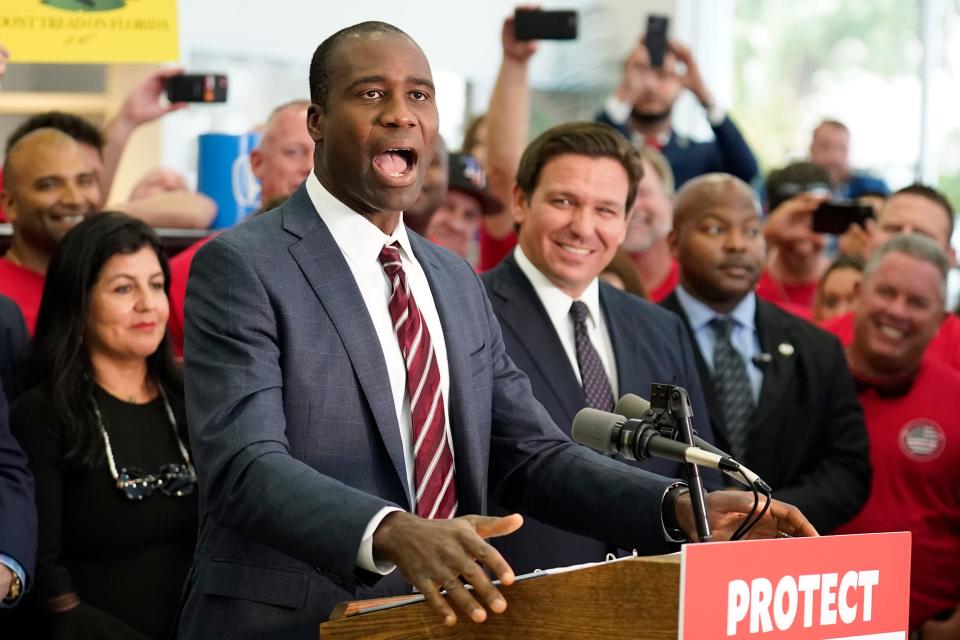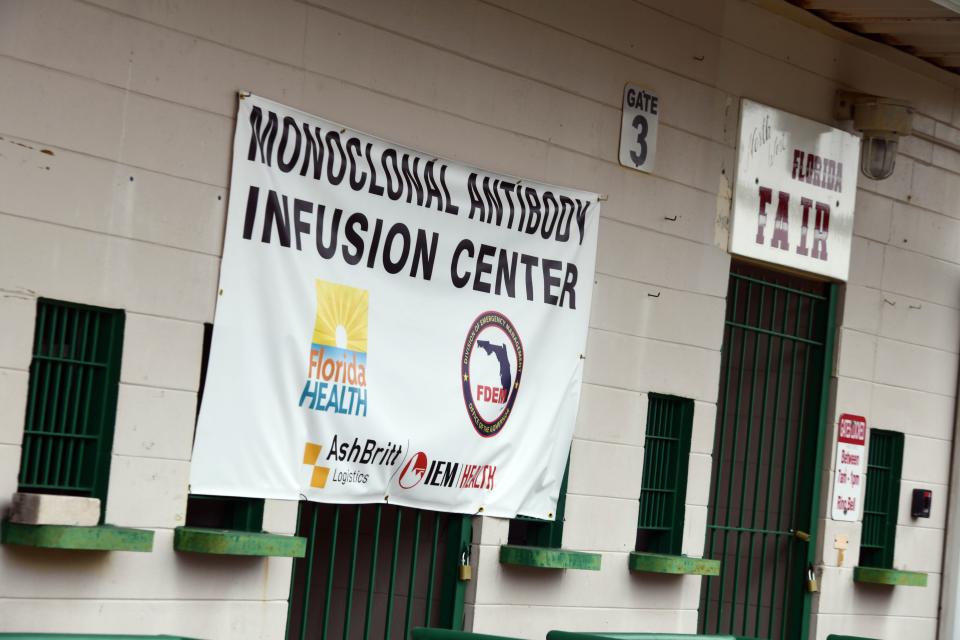DeSantis, Ladapo condemn feds’ decision to stop sending COVID-19 antibody treatments
- Oops!Something went wrong.Please try again later.
- Oops!Something went wrong.Please try again later.
Florida Gov. Ron DeSantis and state Surgeon General Joseph Ladapo are condemning Monday's decision by the U.S. Food and Drug Administration to halt the distribution of antibody treatments that have become central to the state's COVID response.
And DeSantis is even teasing at taking legal action.
Despite all previous indications and warnings from the federal government that these drugs don’t work against the omicron variant, DeSantis has made it the main part of the state’s response to COVID-19, bucking the prevailing wisdom of the national medical community.
Back story:
A 'trifecta' of 'lunacy': Why Florida's COVID response favors treatment, not prevention
Feud between Trump and DeSantis highlights hardening GOP views on COVID-19, vaccines
Because of the FDA's decision Monday, appointments for more than 2,000 Floridians to receive this treatment were canceled Tuesday, the governor said. And all monoclonal antibody treatment sites have been shut down, the Department of Health announced late Monday evening.
At an appearance Tuesday morning at a Wakulla County elementary school to promote literacy, DeSantis lit into the Biden administration's decision.
"What they choose to do with their time (is) pull the rug out (from under) elderly patients, and almost all of them have been vaccinated, and say 'you don't have access to this treatment,' " the governor told reporters.
He added: “We’re going to fight back. Is there a lawsuit potentially? I don't know. We’re going to look. We’re going to see what we can do.”
Meantime Tuesday, White House assistant press secretary Kevin Munoz responded to Lt. Gov. Jeanette Nuñez, who had tweeted earlier that morning that Floridians' "access to treatment shouldn’t be denied based on the whims of a floundering president."
"We are giving an additional 34,000 treatments that are actually effective against Omicron just this week to Florida," Munoz told the USA TODAY NETWORK-Florida. "Floridians (like my family) deserve access to treatments that work against the variant that is over 99% of cases in the state right now."
It is the latest salvo in an ongoing feud between the administration and DeSantis, who is up for reelection in November and widely considered after that to be a presidential contender.
Ladapo — who comes up for his first confirmation hearing before the Florida Senate on Wednesday — said the feds “failed to adequately provide the United States with adequate outpatient treatment options for COVID-19.”
When asked about the dispute between DeSantis and Biden at a Tuesday White House briefing, spokesperson Jen Psaki said this is the latest example of some state leaders "advocating" for so-called treatments that aren't effective and can have dangerous side effects.
"Injecting disinfectant, promoting pseudo-science, sowing doubt on the effectiveness on vaccines and boosters, and now promoting treatments that don't work," she said.
The Food and Drug Administration announced late Monday it was revoking the emergency use authorization granted for drugs from Regeneron and Eli Lilly because they are ineffective against the omicron variant, responsible for nearly all new cases of COVID-19 in the U.S.
The agency said it could reauthorize their use if they prove effective against other variants.

The American Medical Association’s president, Gerald E. Hamilton, praised the federal government for “following the scientific evidence and limiting the use of monoclonal antibody treatments to those that are effective against the omicron variant.”
Contrary to DeSantis and Ladapo, Hamilton said limiting the use of those drugs will ‘help ensure patients receive the best available therapy” and encouraged physicians to reference the federal COVID-19 treatment guidelines for the latest information on recommended therapies and treatments.
“We continue to strongly urge every eligible individual to make sure they are up to date on their COVID-19 vaccinations, including booster doses,” he said.
The U.S. Department of Health and Human Services said in a late night news release that it decided to pause allocations of COVID-19 therapeutics bamlanivimab and etesevimab and casirivimab and imdevimab to make sure that if Americans fall ill with COVID-19 “they get a treatment that actually works.”
Both Regeneron and Eli Lilly say their monoclonal treatments don’t work against omicron, confirmed by several independent studies. Additionally the National Institutes of Health has recommended against use of these products, an HHS spokesman said.

“As such, to ensure people are getting effective treatments against Omicron, HHS is not including the Regeneron and Lilly monoclonal antibody treatments in today’s allocations,” the agency spokesman said.
The agency said it will continue to make other treatments available that do work against omicron, including two antiviral pills from Pfizer and Merck recently approved by the FDA for emergency use, a monoclonal antibody treatment from GlaxoSmithKline and a pre-exposure therapy from AstraZeneca for those with compromised immune systems.
Those treatments are in short supply, as is the one antibody treatment, sotrovimab, that actually works against omicron.
“The FDA also recently authorized commercially-available Remdesivir for outpatient COVID-19 treatment,” the HHS said. It will have about 4 million doses available in January.
“We encourage states and providers to continue offering effective treatments to Americans who get sick with COVID-19, and HHS remains committed to providing these to states at no cost,” the spokesman said.
James Call contributed. Jeffrey Schweers is a capital bureau reporter for USA TODAY NETWORK-Florida. Contact Schweers at jschweers@gannett.com and follow him on Twitter @jeffschweers.
Subscribe today using the link at the top of the page and never miss a story.
This article originally appeared on Tallahassee Democrat: DeSantis, Ladapo condemn stoppage of COVID-19 antibody treatments

